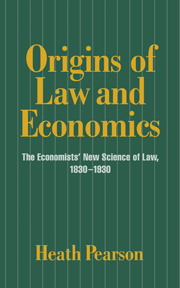4 - A new normative science: Institutional success and failure
Published online by Cambridge University Press: 12 January 2010
Summary
Early in chapter 1 we adduced, as one cause of the tardiness of the explanatory science of rules, the highly judgmental timbre of political economy's early contributions to jurisprudence. Explanation, in other words, had been slighted by evaluation. But this did not mean, conversely, that the new explanatory agenda, once entrenched, necessarily eschewed the normative applications of its insights. In practice, few of our economists attempted to sublimate the traditional categories of “good” and “bad” in favor of anything so bloodless as “probable” and “improbable.” And this is not to be wondered at. The “positivist turn” that we have identified ought, perhaps, to blunt the activist spirit that causes other students to dwell on what might be; but the urge to take sides is so strong that it insinuates itself inexorably into social science, suffusing even very deterministic approaches with defeatist or triumphal tones. In this chapter we shall answer two broad questions that were corollary to the new science: (1) What were the ends to which good laws were supposed to serve as means? In other words, what were the criteria of institutional success? And (2) What were thought to be the political determinants of institutional success and failure? The first question is as old as political economy; it will be developed here primarily as an adjunct to the second problem, which assumed a prominence unheard of before, and outside of, the new science. The “constitutional” problem was the essence of this new normative science of law.
- Type
- Chapter
- Information
- Origins of Law and EconomicsThe Economists' New Science of Law, 1830–1930, pp. 97 - 129Publisher: Cambridge University PressPrint publication year: 1997



